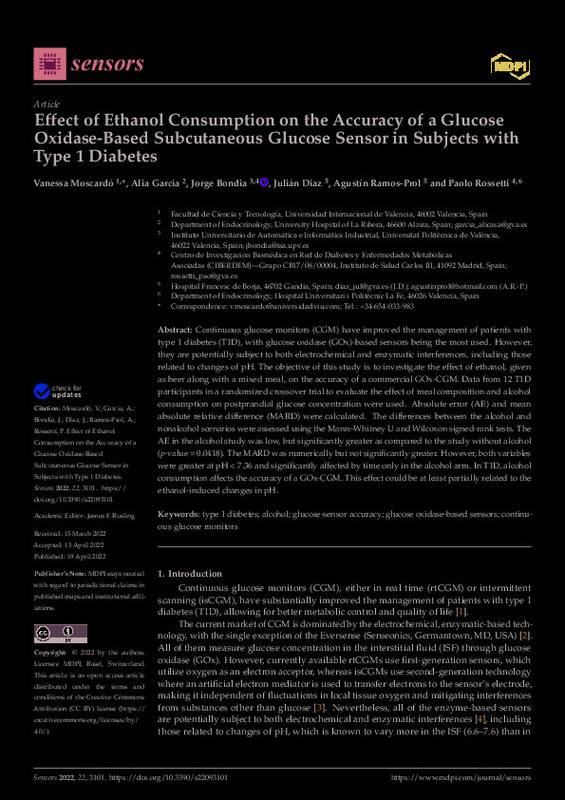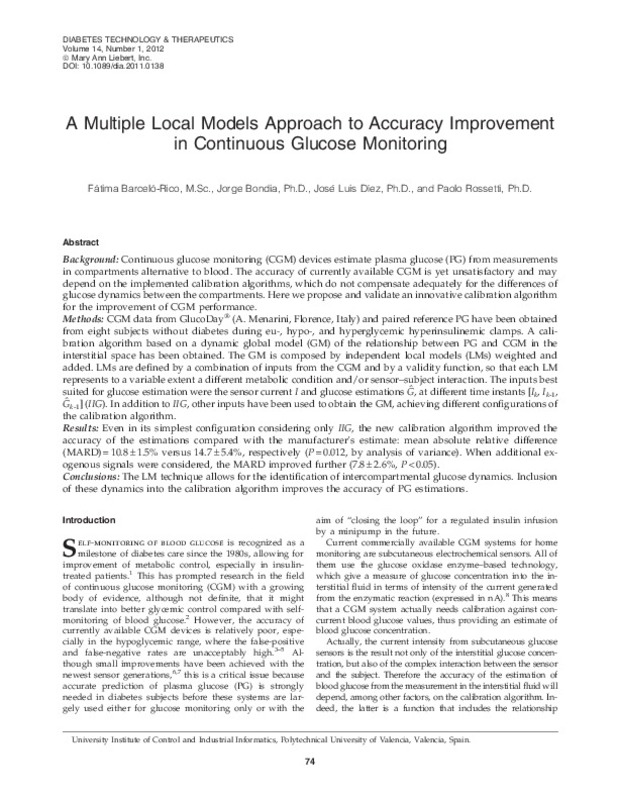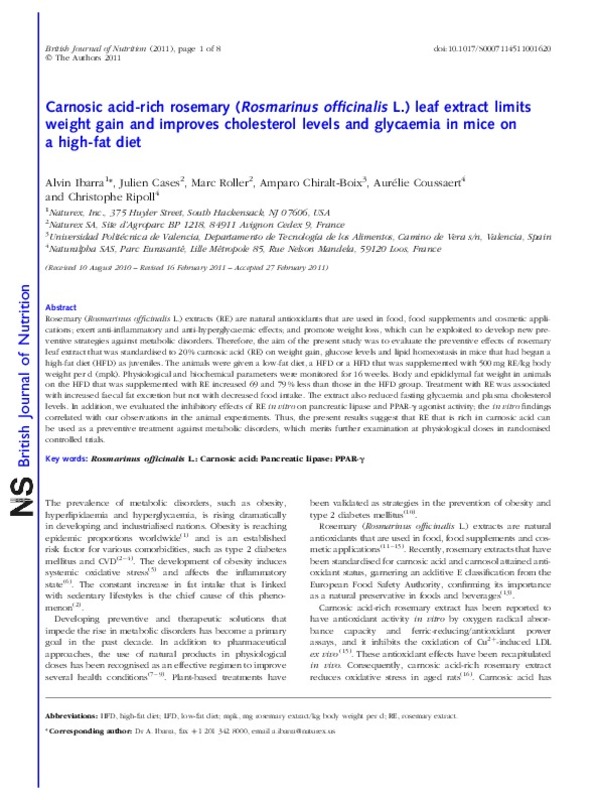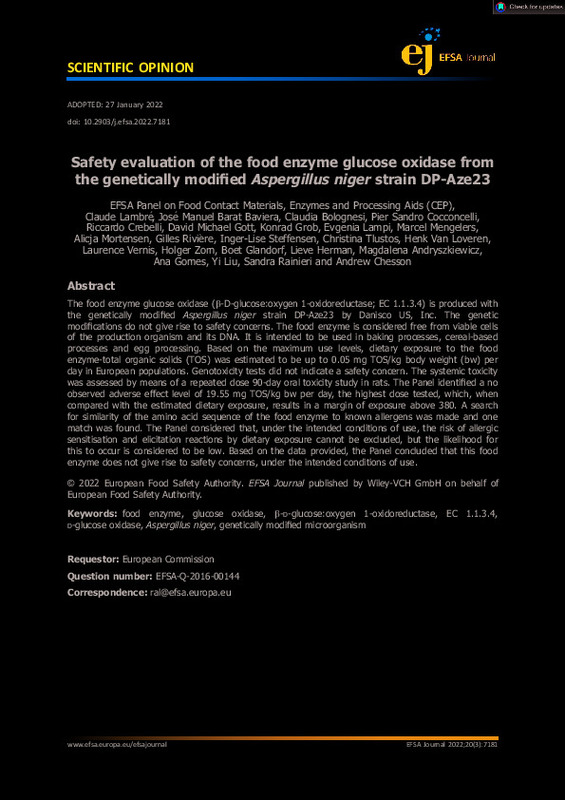JavaScript is disabled for your browser. Some features of this site may not work without it.
Buscar en RiuNet
Listar
Mi cuenta
Estadísticas
Ayuda RiuNet
Admin. UPV
Effect of Ethanol Consumption on the Accuracy of a Glucose Oxidase-Based Subcutaneous Glucose Sensor in Subjects with Type 1 Diabetes
Mostrar el registro sencillo del ítem
Ficheros en el ítem
| dc.contributor.author | Moscardó, Vanessa
|
es_ES |
| dc.contributor.author | Garcia, Alia
|
es_ES |
| dc.contributor.author | Bondía Company, Jorge
|
es_ES |
| dc.contributor.author | Diaz, Julián
|
es_ES |
| dc.contributor.author | Ramos-Prol, Agustín
|
es_ES |
| dc.contributor.author | Rossetti, Paolo
|
es_ES |
| dc.date.accessioned | 2023-10-24T18:01:52Z | |
| dc.date.available | 2023-10-24T18:01:52Z | |
| dc.date.issued | 2022-05 | es_ES |
| dc.identifier.uri | http://hdl.handle.net/10251/198754 | |
| dc.description.abstract | [EN] Continuous glucose monitors (CGM) have improved the management of patients with type 1 diabetes (T1D), with glucose oxidase (GOx)-based sensors being the most used. However, they are potentially subject to both electrochemical and enzymatic interferences, including those related to changes of pH. The objective of this study is to investigate the effect of ethanol, given as beer along with a mixed meal, on the accuracy of a commercial GOx-CGM. Data from 12 T1D participants in a randomized crossover trial to evaluate the effect of meal composition and alcohol consumption on postprandial glucose concentration were used. Absolute error (AE) and mean absolute relative difference (MARD) were calculated. The differences between the alcohol and nonalcohol scenarios were assessed using the Mann-Whitney U and Wilcoxon signed-rank tests. The AE in the alcohol study was low, but significantly greater as compared to the study without alcohol (p-value = 0.0418). The MARD was numerically but not significantly greater. However, both variables were greater at pH < 7.36 and significantly affected by time only in the alcohol arm. In T1D, alcohol consumption affects the accuracy of a GOx-CGM. This effect could be at least partially related to the ethanol-induced changes in pH. | es_ES |
| dc.description.sponsorship | This research was funded by grant DPI2016-78831-C2-1-R funded by MCIN/AEI/10.13039/501100011033 and by "ERDF A way of making Europe"; and grant PID2019-107722RBC21 funded by MCIN/AEI/10.13039/501100011033. | es_ES |
| dc.language | Inglés | es_ES |
| dc.publisher | MDPI AG | es_ES |
| dc.relation.ispartof | Sensors | es_ES |
| dc.rights | Reconocimiento (by) | es_ES |
| dc.subject | Type 1 diabetes | es_ES |
| dc.subject | Alcohol | es_ES |
| dc.subject | Glucose-sensor accuracy | es_ES |
| dc.subject | Glucose oxidase-based sensors | es_ES |
| dc.subject | Continuous glucose monitors | es_ES |
| dc.subject.classification | INGENIERIA DE SISTEMAS Y AUTOMATICA | es_ES |
| dc.title | Effect of Ethanol Consumption on the Accuracy of a Glucose Oxidase-Based Subcutaneous Glucose Sensor in Subjects with Type 1 Diabetes | es_ES |
| dc.type | Artículo | es_ES |
| dc.identifier.doi | 10.3390/s22093101 | es_ES |
| dc.relation.projectID | info:eu-repo/grantAgreement/AEI/Plan Estatal de Investigación Científica y Técnica y de Innovación 2017-2020/PID2019-107722RB-C21/ES/SOLUCIONES A MEDIDA DEL PACIENTE PARA EL CONTROL DE GLUCOSA EN SANGRE EN DIABETES TIPO 1/ | es_ES |
| dc.relation.projectID | info:eu-repo/grantAgreement/AEI//DPI2016-78831-C2-1-R//SOLUCIONES PARA LA MEJORA DE LA EFICIENCIA Y SEGURIDAD DEL PÁNCREAS ARTIFICIAL MEDIANTE ARQUITECTURAS DE CONTROL MULTIVARIABLE TOLERANTES A FALLOS/ | es_ES |
| dc.rights.accessRights | Abierto | es_ES |
| dc.contributor.affiliation | Universitat Politècnica de València. Escuela Técnica Superior de Ingenieros Industriales - Escola Tècnica Superior d'Enginyers Industrials | es_ES |
| dc.contributor.affiliation | Universitat Politècnica de València. Instituto Universitario de Automática e Informática Industrial - Institut Universitari d'Automàtica i Informàtica Industrial | es_ES |
| dc.description.bibliographicCitation | Moscardó, V.; Garcia, A.; Bondía Company, J.; Diaz, J.; Ramos-Prol, A.; Rossetti, P. (2022). Effect of Ethanol Consumption on the Accuracy of a Glucose Oxidase-Based Subcutaneous Glucose Sensor in Subjects with Type 1 Diabetes. Sensors. 22(9):1-9. https://doi.org/10.3390/s22093101 | es_ES |
| dc.description.accrualMethod | S | es_ES |
| dc.relation.publisherversion | https://doi.org/10.3390/s22093101 | es_ES |
| dc.description.upvformatpinicio | 1 | es_ES |
| dc.description.upvformatpfin | 9 | es_ES |
| dc.type.version | info:eu-repo/semantics/publishedVersion | es_ES |
| dc.description.volume | 22 | es_ES |
| dc.description.issue | 9 | es_ES |
| dc.identifier.eissn | 1424-8220 | es_ES |
| dc.identifier.pmid | 35590791 | es_ES |
| dc.identifier.pmcid | PMC9104985 | es_ES |
| dc.relation.pasarela | S\490286 | es_ES |
| dc.contributor.funder | AGENCIA ESTATAL DE INVESTIGACION | es_ES |
| dc.contributor.funder | European Regional Development Fund | es_ES |
| upv.costeAPC | 2356,72 | es_ES |











